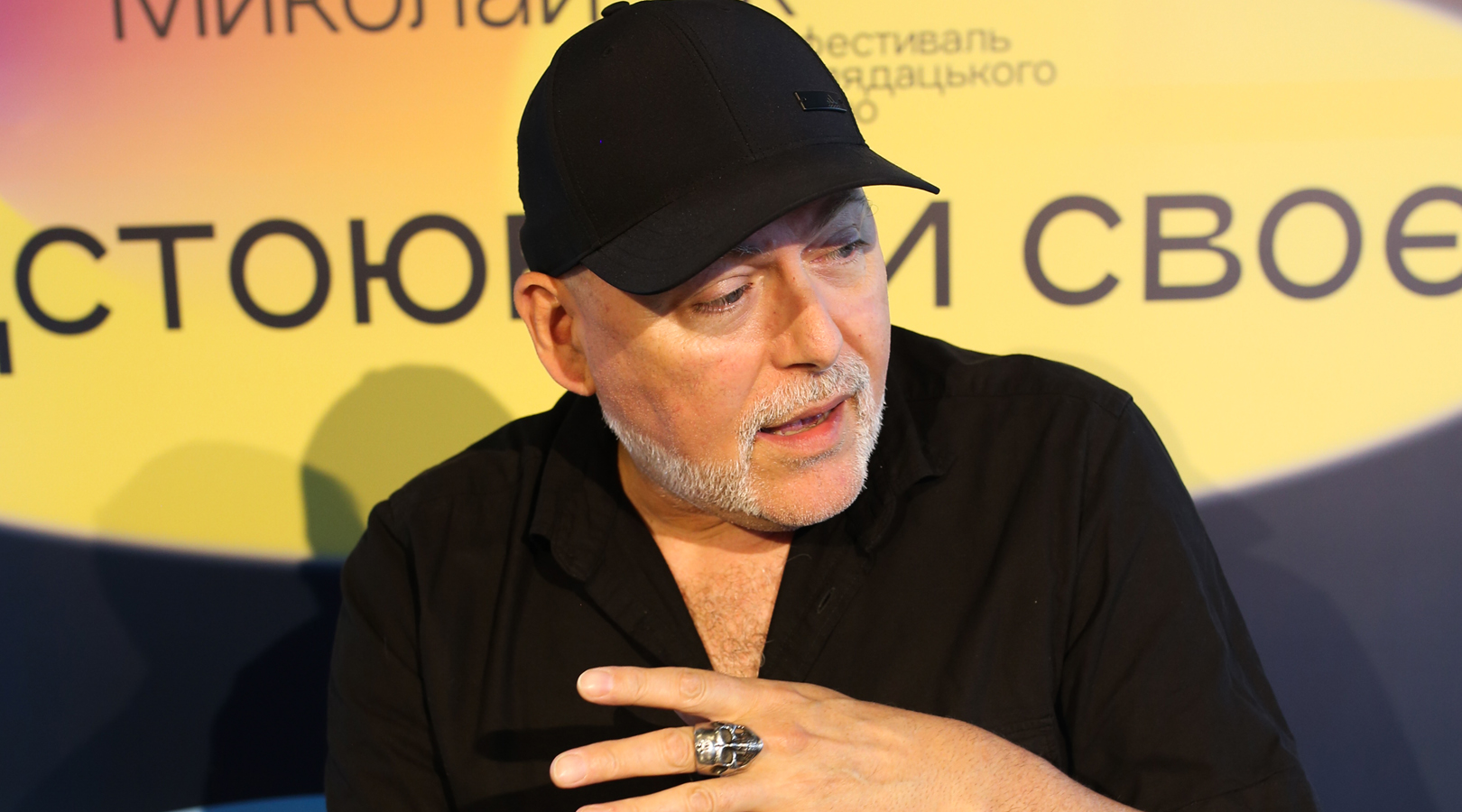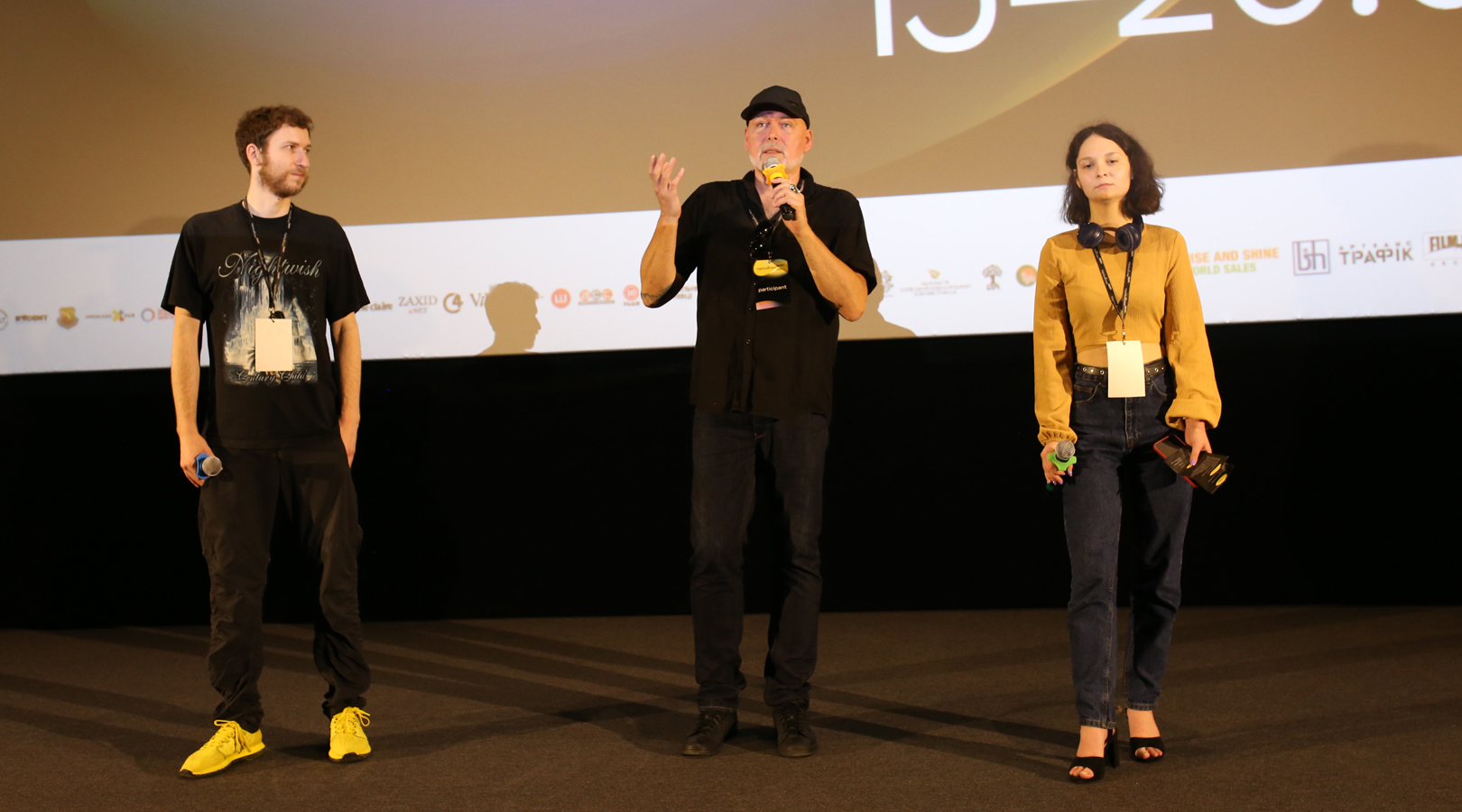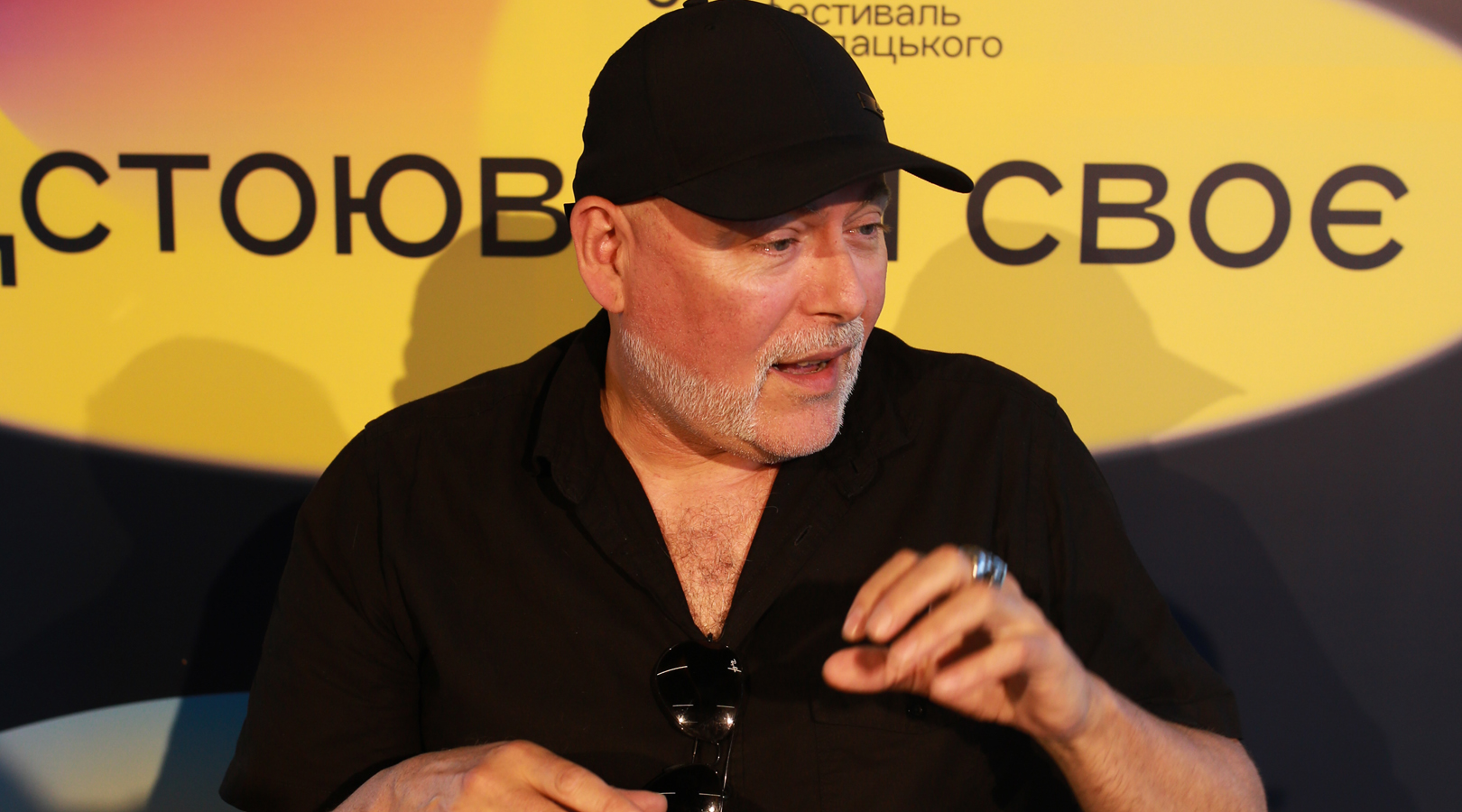Seeds of Hunger. Ukraine 1933 is a documentary made by Guillaume Ribot, a French director, which has been shown at the Mykolaichuk OPEN film festival in Chernivtsi as part of its out-of-competition program. The director said that he had already presented his film on French television and in the French Parliament. After some time, the French Senate recognized the Holodomor of 1932-1933 as the genocide of the Ukrainian people.
The Ukrinform correspondent asked the French film director how the idea came about to make this film, why the world was only now beginning to officially recognize Holodomor as the genocide of the Ukrainian people, and in what way the incumbent president of Russia reminded him of Joseph Stalin, one of the bloodiest leaders of the Soviet Union.
THE FRENCH WERE UNAWARE OF HOLODOMOR
- Please tell us a little bit about the film you came with to our festival.
- I made the decision to shoot this film quite a long time ago. I visited Ukraine many times while working on one of my photo projects about the executions of Jews during World War II. I toured many Ukrainian villages and towns, talked to elderly people there, and asked them about the crimes of Nazis in Ukraine and whether the people had seen executions of Jews or had any testimonies.
And in a village in the Vinnytsia region, I talked to a local old woman. When the camera was already off, she asked me whether I knew that a decade before the mass killings of Jews during World War II, the Ukrainians themselves had suffered from a terrible famine, and hundreds of residents of this village died of the lack of food.
I never heard about it and could not believe her words. “What do you mean?” I said. “You have the most fertile soils in the world, and you have plenty of grain! It seems that you can just shove a stick in the ground, and it begins bearing fruit. It is impossible for people here to die from hunger.” She explained to me that actually there was plenty of grain in the village, and everyone had stocks in their house, but Stalin came and took everything away.
I still remember the words of this old lady. When I began to make the documentary, I recalled this story and decided to share the story of the hunger in Ukraine. After all, if we talk about France, indeed, no one there knew anything about Holodomor of 1932-33 in Ukraine. So, I decided to make such a film.
- Did you happen to visit our country while working on the film Seeds of Hunger?
- No, I didn’t come to Ukraine in person when I was working on the film itself. However, I had a colleague documentarian who worked here in Kyiv in a local archive. It was there that we found lots of valuable photos, and it happened not long before the full-scale Russian invasion. However, the great war broke out in Ukraine, and everything became closed.
We could not receive important information from the Ukrainian archive then. That’s why we contacted a Moscow archive. After all, everything kept in the archives of the former USSR republics was duplicated in Moscow. We had to pay large sums of money to obtain these materials from the Moscow archive, as it was impossible to get them in Ukraine.
Moreover, I worked on this film together with Nicolas Werth, a French historian, who is one of the best researchers of the Soviet Union.
- Your film shows the role of journalists and of journalism in sharing in the world the horrific truth about Holodomor of 1932-33. On the one hand, Gareth Jones, an aspiring journalist, makes every effort to see and share the truth, and on the other hand, Walter Duranty, a famous Pulitzer prise winner, seeks to hide this truth by all means. Has anything changed in today’s global journalism if we take as example the coverage of the Ukrainian-Russian war?
- In fact, Walter Duranty was not a true journalist. After all, he confirmed in his private talks that he knew about this heinous crime of the Soviets in Ukraine. He was saying that, indeed, millions of people were dying of hunger there. However, he denied everything while writing for New York Times, where he was working at that time. He argued that there was no famine whatsoever and there were no mass deaths in Ukraine.
Today, the whole world knows that what he wrote about the Soviet authorities in New York Times was a lie, and Gareth Jones, who was the first in the world to speak about Holodomor of 1932-1933, was right. This notwithstanding, Walter Duranty still has not been stripped of his Pulitzer Prize. By the same token, it has not been awarded to Gareth Jones, who risked his life to tell the world about that Stalin’s crime.

As for the current events, I can give my opinion about them as an ordinary Frenchman who watches French TV and reads French newspapers. However, I guess the situation is just the same in other European countries. Well, almost everyone in my country knows now that Russia is lying, and Putin is lying when he talks about the current war in Ukraine. They know that Ukraine and Russia are not fraternal peoples of any kind; it is all lies and propaganda of their media.
For example, just some days ago, I saw Putin say with indignation that Ukraine was bombing the peaceful population of Russia (it was about Belgorod region - author’s note), and just the next day, we saw the Russians attack residential houses in Odesa and Kryvyi Rih.
Of course, there is a small number of people in France who still believe the Russian propaganda and think NATO to be an aggressor, but they are very, very few. For example, about a month ago, France officially recognized the Holodomor of 1932-1933 as the genocide of the Ukrainian people. 95% of Senate members voted in favor of this decision, and only a small percentage of them were against it, and these were Communists. They are still “blind” and do not see the truth.
We have presented our film about Holodomor in Ukraine on French television. It was quite a sensation, and a lot of press, they interviewed me. And L’Humanité, the communist newspaper, also interviewed me. I wanted them and their readers to finally open their eyes to those crimes of the Soviet Government in Ukraine. But they called me before the publication and said they couldn’t publish the material because I had said that Holodomor had been the genocide of the Ukrainians. I told them that it was true, it really happened. Nonetheless, they refused to publish this interview.
I UNDERSTOOD THAT I FELL IN LOVE WITH THE UKRAINIAN PEOPLE
- You have already presented your film at another festival, Docudays, in Kyiv. How did the audience and critics receive it?
- Of course, it was much easier to show this film in France than in Ukraine. Here I look at the audience and understand that many of the people present in the room have relatives who may have lived through such horror. A man from the Docudays UA festival team told me that even he could not watch my film to the end. It was very hard for him to watch it because his great-grandmother suffered from Holodomor.
Showing this film in Ukraine was very impressive. The audience was very attentive, caring and emotional. Many asked me after the show why I became interested in Ukrainian history.
- So, after all, why did you decide to raise a topic which is so difficult to perceive? In fact, you started working on it before the large-scale Russian invasion, when our country was not much talked about globally.
- Being a Frenchman by nationality, I am, however, a human being, first and foremost. I am a human being who loves truth. Perhaps, it is my humanistic mission to tell this story to the whole world.
Indeed, I visited Ukraine from 2004 to 2008, and I met thousands of witnesses of horrific crimes; I came to their houses. These people were mostly poor but they were sincere. It was then that I understood that I fell very much in love with Ukraine and the Ukrainian people.
- You have already mentioned that about a month ago, the French Senate, in the footsteps of other European countries, recognized the Ukrainian Holodomor of 1932-1933 as an act of genocide against the Ukrainian people. Why, in your opinion, had this decision not been taken earlier?
- Certainly, I cannot speak for our whole Senate (he smiles – author’s note). But I also have my opinion on this. Before this war, France, like most other European countries, did not want to tease today’s Russia and Putin as its leader. They were maintaining a certain balance and keeping their distance from him; they did not want to irritate him once again.
But when the full-scale invasion in Ukraine began, everyone realized that Russia was the aggressor and there was no one to be irritated and nothing to irritate with. That’s why the whole world started, at last, to say the truth and act as it deemed necessary. Even at the beginning of the great war, our President Emmanuel Macron tried to call Putin, contact him, explain, and ask something. However, the French President changed his behavior when he realized that Putin would not stop this war that easily.
It is also important for Europe that Germany has recognized Holodomor as genocide. Germans know well what crimes against humanity are, and they remember the deeds of their ancestors during World War II. So, if even Germany has recognized Holodomor as the genocide of the Ukrainian people, other European nations are also making similar decisions.

A very telling moment of my film is the fact that the Western countries knew everything about Holodomor in Ukraine. Nevertheless, they needed cheap grain from the Soviet Union to mitigate the aftermath of the Great Depression. That is why they said nothing to the Soviet authorities about the crimes they committed in Ukraine. On the other hand, most European nations feared Nazis, who were emerging as an ever more powerful force back then.
The connection between the past and the present is clearly visible. After all, we witness the similar cynicism now. However, this time Europe needs Russian gas and energy, not grain. Germany was heavily dependent on Russian gas, but when explosions occurred at the North Stream pipeline, Europe got rid of this dependence very quickly. Now we have to build something new, preferably together with the Ukrainian people.
THE UKRAINIANS MUST SHOOT MORE FILMS ABOUT RUSSIAN CRIMES
- We can see that, in the global cultural space, there exist much more products about the crimes of Nazi Germany during World War II than about the Soviet crimes of the Stalin era. Why is it so?
- Yes, indeed, a lot more films are being made, including documentaries, about Nazi crimes. However, it is even more important than films that these crimes were officially prosecuted during the Nuremberg process of 1945. This allowed Germany, after its liberation from Nazism, to build a new society and get a new start. Unfortunately, there was no trial similar to the Nuremberg trials to prosecute for the crimes of the Soviet Union. The crimes of the USSR Communists have never been officially prosecuted. So, Russia, being a successor state of the Soviet Union, was always able to deny these crimes.
Moreover, making a documentary about a certain event requires working with such archive data as photos, videos and texts. Later, they can be converted into a quality documentary film. The Holocaust and other Nazi crimes were covered in great detail, often even by the Germans themselves. I mean, there are many photos and videos shot by Nazi soldiers, and lots of evidence and living witnesses to those crimes remained. So, there are both materials and witnesses when it comes to the Holocaust. But when we talk about Holodomor in Ukraine, only 26 genuine photos of those events remain. Just imagine that only 26 photos remained while there were from four to five million victims.
In 1956, when Krushchov debunked the cult of Stalin at the party congress in the Soviet Union, and the crimes of this tyrant were revealed, there was only one crime about which the Soviet authorities kept silence then. Do you know what it was? Yes, indeed, it was the Holodomor of 1932-1933.
- Isn’t it time now to change the situation and make more films about the crimes of the Soviet era?
- In fact, the war which is going on in your country has already changed many things and continues to do so. But I think that it is the Ukrainian filmmakers who should be the first to raise the themes related to the tragic pages of your history. After all, it will be impossible for you to build a bright future without researching your past and reflecting on it. Yes, it is also a problem that few witnesses remain, as well as little evidence from people who are able to speak about past Soviet crimes. This search should, however, be conducted; you should search for people and retell their stories. The Ukrainian artists themselves should address painful topics of your history.
For example, when the Russian troops captured and razed to the ground Mariupol last year, one of the first memorials they destroyed was dedicated to Holodomor victims. This moment is very telling as it proves that the Ukrainians are right. If they (Russians) still deny it and say that it never happened, this itself implies that the Ukrainians are telling the truth. It is your duty to convey this truth to the whole world.
- Why, in your opinion, is it worth showing the world right now such tragic pages from Ukrainian history?
- It should be done because of that same link between the past and the present. I included a testimony of the Italian consul in my film; he argues that in 1933, a violent ethnic invasion of the USSR in Ukraine occurred. Indeed, after Holodomor, which had killed lots of Ukrainians, the territories freed of them were populated by ethnic Russians. It’s true for all regions that suffered from hunger, but mostly for Donbas and Kharkiv regions.
It was Stalin’s policy to populate the ethnic regions of Ukraine with Russians. He committed the same crime against the Crimean Tatars as he deported them and settled Russians there. Now we see that Putin does the same, as he expels ethnic Ukrainians from the occupied territories and populates them with Russians.
Do you know that Holodomor triggered the repressions of cultural figures in the Soviet Union? The Soviet Union banned then the Ukrainian language and the Ukrainian culture and politics. It was also kind of an act of cultural genocide against Ukrainians.
We can see a clear link between that Stalin’s policy and today’s Putin’s policy in the occupied Russian territories. All Ukrainian schoolbooks were changed for Russian ones, school students are forced to speak only Russian, they are forced to sing the Russian anthem. The same thing happened in 1933 as they taught lessons in Russian at schools, banned the Ukrainian language, and led the artificial Russification of Ukraine. Therefore, if you do not research and remember your past, your future will be just as tragic.
- There is a full-scale war in Ukraine going on for the second year already; at any instance, air raid sirens can resound, and an enemy missile can fly in. Wasn’t it scary for you to come here for the film festival?
- In France, when they got to know that I was going to attend the festival in Ukraine where the war was going on, all of them asked me if I was crazy. But I answered them that precisely because this country was at war, I went there. I want to express my support to the Ukrainian people and be here with you now.
When I came to Kyiv, I was astonished to see that people here were quite calm and confident in what they were doing. Everyone told me that they were confident in their army and anti-missile defense. At the same time, everyone here was aware of the danger, and I was aware of it too: however, I somehow embraced this Kyivans’ confidence, and when I heard the air raid signal, I did not go down to the shelter.
- What will you be working on in the near future?
- I would like to shift the creative focus of my work. Indeed, working on the Holocaust and Holodomor topics exhausted me a lot. However, it’s hard to radically change the topic that quickly. I am now working on the film explaining the Shoah film directed by Claude Lanzmann, which is one of the most famous and important documentaries about Holocaust. I am working together with this director’s wife, and this will be a kind of film about a film.

Also, I have an idea for another project to recover from these difficult topics. I have already started working on a film about Miles Davis, one of the most famous jazz musicians. It will be a beautiful project, a film about his life.
- Do you have plans to make a documentary about current events in Ukraine?
- Shooting films about today’s events is not my niche. I like working with archives. I believe that it is your artists who primarily should make films about today’s war. I am sure they will cope well with this challenge.
Vitaliy Oliinyk, Chernivtsi
Photo: Mila Sofovych, “Mykolaichuk OPEN”
